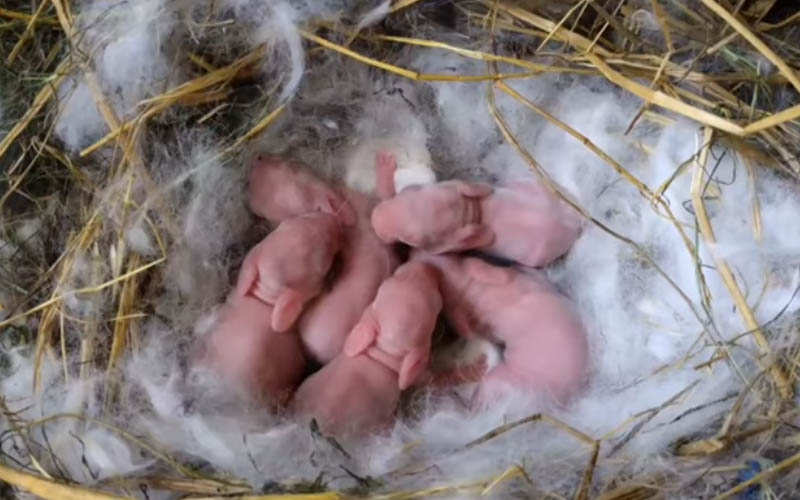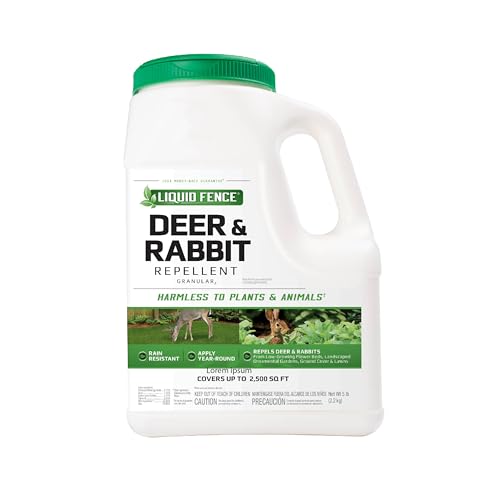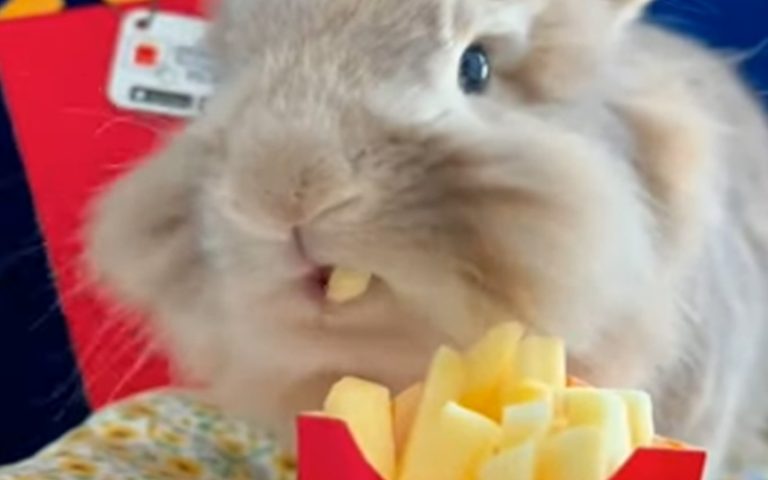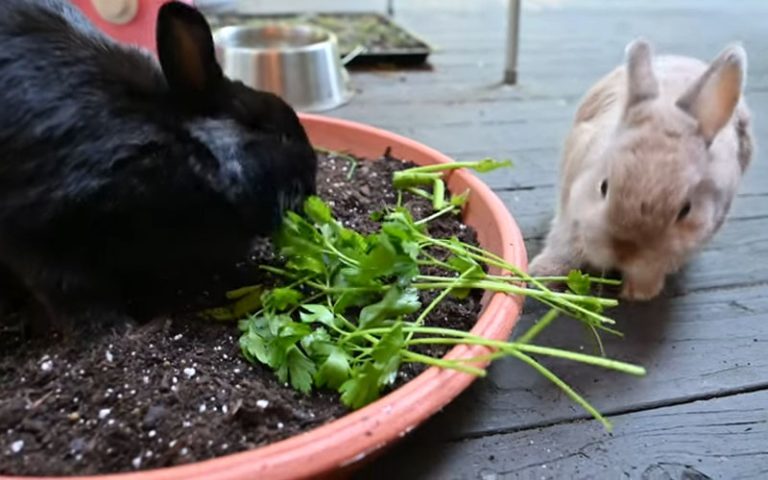How To Tell If Baby Rabbits Are Dead? (5 Signs)
To check if baby rabbits are dead, gently touch their bodies. If they’re unresponsive, with no movement or warmth, they may be deceased. Look for signs like stiff limbs or lifeless eyes. If unsure, consult a veterinarian for guidance on confirming their status and appropriate steps to take.
Raising baby rabbits can be both rewarding and challenging. One crucial aspect of caring for them is knowing how to tell if baby rabbits are dead.
In this comprehensive guide, we’ll explore the various signs and signals that indicate the death of baby rabbits.
How to Tell If Baby Rabbits Are Dead? – 5 Signs
Determining if baby rabbits are dead can be challenging, especially because they are delicate and may not exhibit obvious signs.
Here are five signs how to tell if baby rabbits are dead:
1. Lack of Movement
If baby rabbits aren’t moving, gently touch them to check for signs of life. Healthy bunnies will respond with slight twitches or movements.
Lack of activity might suggest distress or, unfortunately, that they’re no longer alive. Stay observant for any signs of movement and respond promptly to their needs.
2. No Responsiveness
Gently touch the baby rabbits to check for responsiveness. Healthy ones will react, showing movement or a subtle response when touched. If there’s no reaction, it could indicate a lack of awareness or, in some cases, lifelessness.
This absence of response suggests the need for immediate attention, and contacting a veterinarian is advisable to assess the situation and provide guidance.
3. Coolness to the Touch
If the baby rabbits feel cool to the touch, it suggests they might be in distress or deceased. A rabbit’s body is usually warmer than its surroundings. Place your hand gently on the babies and check for warmth.
If they feel unusually cool or cold, it’s a sign of potential trouble. This coolness could indicate a lack of normal body warmth, signaling the need for immediate attention or veterinary assistance.
4. No Signs of Breathing
If you don’t see the baby rabbits’ tiny chests rising and falling, it’s a cause for concern as it suggests they are not breathing. Check for subtle movements or the absence of any signs of breath, such as chest expansion.
Lack of breathing may indicate a serious issue, and prompt action is needed to ensure the well-being of the rabbits. If unsure, seek assistance from a veterinarian for proper evaluation and guidance.
5. Limpness
If baby rabbits feel completely limp and floppy, it’s a concerning sign. A healthy rabbit should have some firmness to their body, but limpness suggests weakness or potential distress.
Gently touch and observe for any signs of movement or muscle tone. If they remain entirely limp, it may indicate a serious issue, and seeking professional advice from a veterinarian is recommended to ensure the best care for the rabbits.
Addressing Common Misconceptions
1. Avoiding the “Playing Dead” Phenomenon
Steer clear of misconceptions surrounding the “Playing Dead” phenomenon. Rabbits, in moments of perceived danger, might feign death as a protective measure.
Don’t be alarmed—this behavior is a survival instinct, not a sign of distress. Keep a watchful eye, but understand that a brief spell of stillness doesn’t necessarily mean a baby rabbit is in peril.
2. Consideration for Newborn Vulnerability
Newborn rabbits are exceptionally fragile, and their delicate state can be misleading. It’s crucial to recognize that their frailty and limited mobility are normal for their early stage of development.
Instead of assuming weakness, appreciate the vulnerability inherent in their infancy. Understanding this natural fragility ensures a nurturing approach, allowing breeders to provide the care and support necessary for the healthy progression of these adorable baby rabbits.
Taking Action: Steps to Confirm Suspicions
1. Gentle Stimulation
When doubt clouds the vitality of a baby rabbit, swift action is imperative. Gently stimulate the bunny by softly stroking its body with a warm, gentle cloth.
This tactile approach encourages responsiveness, offering a lifeline to potentially distressed rabbits. Observe closely for any signs of movement or reaction, reaffirming life’s presence.
2. Seeking Professional Assistance
When uncertainty lingers, it’s crucial to promptly seek the help of a veterinarian specializing in small mammals.
A skilled professional can conduct a thorough assessment, offering precise insights into the health of your baby rabbits. Their expertise allows for accurate diagnosis and, if necessary, life-saving interventions.
Don’t hesitate to reach out to these specialists, as their knowledge and experience play a pivotal role in ensuring the well-being of your furry companions.
Nurturing the Health of Baby Rabbits
1. Ensuring Proper Nest Conditions
Creating an ideal haven for baby rabbits begins with ensuring proper nest conditions. Place soft, warm bedding in their nesting area, providing a cozy space for the little ones.
Make certain the temperature remains steady, shielding them from chilly drafts. Regularly check and adjust the nesting material, ensuring it stays clean and dry.
2. Balanced Nutrition for Nursing Mothers
Nourishing your rabbit’s health starts with ensuring momma bunny gets the right nutrients. Feed her a diet rich in fresh greens, hay, and pellets to guarantee a well-rounded nutritional intake. Fresh water is a must, keeping her hydrated for optimal milk production.
Prioritize foods high in fiber and essential vitamins, fostering a robust constitution for both the nursing mother and her precious offspring.
FAQ
Baby rabbits can suddenly die without showing any signs. Sometimes, underlying health issues or stress can lead to unexpected death. It’s crucial to provide a healthy environment, proper nutrition, and regular veterinary check-ups to ensure their well-being.
It’s normal for baby rabbits to sleep a lot. Young rabbits, like human babies, need plenty of rest for growth and development. They typically nap frequently throughout the day, and this behavior is completely normal. Ensure they have a quiet, comfortable environment for their needed sleep.
Common signs of distress in baby rabbits include constant squirming, excessive crying or squealing, refusal to eat, and a hunched posture. If you notice these behaviors, it’s crucial to seek prompt veterinary attention. Rapid breathing, lethargy, or discharge from the eyes or nose are also red flags.
If you find a seemingly lifeless baby rabbit, act swiftly. Gently warm the little one by cradling it in your hands. Rub its body to stimulate blood flow and warmth. Offer a small amount of rehydration solution, like a mix of water and sugar.







